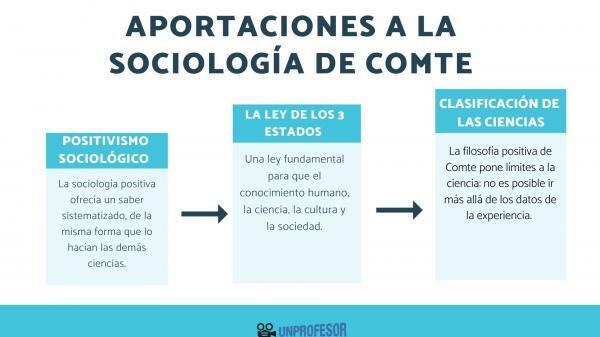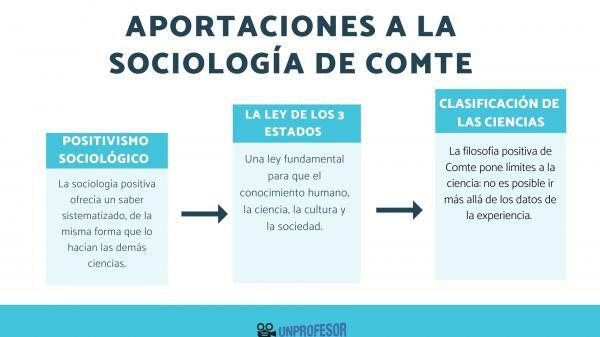Augusto COMTE: most important contributions to sociology

In this lesson from a PROFESSOR you will learn about the contributions to the sociology ofAugusto Comte, considered the father of this science. The French philosopher made a science classification, where he placed in the first positions those less complex, but more abstract, starting with Mathematics, Mechanics, Astronomy, Physics, Chemistry and Biology, Sociology. The latter was not a science at the time, and Comte, demanded its constitution as such. With this, he intends to recover for Europe, the same unity that it had had during the Middle Ages. But this new society that he claimed was to be built on a new foundation. This time it would not be faith in God that would keep the West in harmony, but science. Later, create the positive philosophy and then positive religion, of which he would proclaim himself high priest.
If you want to know more about the contributions of Augusto Comte to sociology, he continues reading this article from a PROFESSOR. Start the class!
Index
- The sociological positivism of Augusto Comte, his great contribution to sociology
- The law of the three states, one of the main contributions of Comte
- science Clasification
The sociological positivism of Augusto Comte, his great contribution to sociology.
Augusto Comte he was convinced that thepositive sociology it would restore to the West the social order that it had maintained in the past. Positive sociology offered systematized knowledge, in the same way that the others did. Sciences. Comte's new science was divided into two parts: social statics and social dynamics. Below we explain what each of them consists of.
Social static
It attends to the general features that are shared by all societies, and at all times. Thus, study the family, the division of job or the ways of socialize. For the father of sociological positivism, the family was a fundamental element in society, being what held it together. Family, he thought, is something natural, and divorce, therefore, an act against nature. It's not the individuals, he says Comte, those who form society, but families.
On the subject of the equality the philosopher is against, affirming that if any person can carry out any function, the society would become anarchic. Nor is he, therefore, in favor of gender equality, defending the subordination of women to men. He was also against the political theories emanating from the Revolution from 1848.
Social dynamics
It deals with the study of the laws of development of humanity, being the three state law the most important. The progress of society is governed by this law, says Comte.
“All our speculations are inevitably subject, both in the individual and in the species, to pass successively through three different theoretical stages: theological, metaphysical, and positive”.
Under the law of the three states the humanity has gone through, to this day, three stages of development, from the simplest state to the definitive state: the positive status. This does not mean that human knowledge is exhausted. The Advance knowledge is unstoppable. Each state is a consequence of the previous one and the cause of the next.
With Augusto Comte, Sociology is constituted as a positive science, and its goal is the balance of society from a single method: the scientific method.
The law of the three states, one of the main contributions of Comte.
The law of the three states was, according to Augusto Comte, his main contribution to the sociology, a fundamental law so that human knowledge, science, culture and society as a whole, can progress. It constitutes a critique of metaphysics and religion, and at the same time, a defense of positivism. Thus, he calls for a new classification of the sciences.
Human knowledge, according to Comte, is the result of a slow process based on this law:
“Studying the total development of human intelligence, in its various spheres of activity, from its first simplest manifestation to the present day, I believe I have discovered a great fundamental law, to which it is subjected, by an invariable necessity, and which, it seems to me, can be established with rational proofs and also by means of verification historical”.
All knowledge, therefore, must necessarily pass through three states: the theological or fictitious state; the metaphysical or abstract state; scientific or positive status. This is, without a doubt, another of the most important contributions of Augusto Comte to Sociology.
The three stages or states of development of humanity
1) Theological, or fictitious state
Intelligence development. Supernatural explanation of the phenomena. This stage is in turn divided into three others:
- Fetishism: animated beings are not distinguished from inanimate ones and natural phenomena are considered divine
- Polytheism: replacement of natural phenomena by different deities.
- Monotheism: belief in a single divinity
2) Metaphysical, or abstract state
A path of transition. A personified God creates and controls the world.
3) Scientific status, or positive
Definitive state. All phenomena are susceptible to investigation based on the scientific method.
“I believe that this history can be divided into three great epochs, or states of civilization (...) The first is the epoch theological and military (…) The second is the metaphysical and legalistic era (…) in short, the third is the scientific and industrial”

Science Clasification.
The classification of the sciences is another of the most important contributions of Augusto Comte to Sociology. The positive philosophy de Comte sets limits to science: it is not possible to go beyond the data of experience. It is not necessary to resort to any supernatural entity to explain the world, but to attend to the laws of nature, they are always the same.
Therefore, it is necessary to exclude from the scientific field all those so-called knowledge with a metaphysical or theological basis, which is why both theology and metaphysics were left out of its scope. classification.
Comte proposes a single method for all the sciences, which according to him, only differ in their degree of complexity and based on this he establishes a hierarchy of them:
- Mathematics. It is the simplest science of all, as its focus is the simplest level of reality: quantity
- Astronomy: in addition to quantity, study the forces between bodies
- Physical: it is more complex than the previous ones as its studies include qualities such as light
- Chemistry and the biology: their degree of complexity increases when dealing with sciences that deal with organizing and ordering matter

If you want to read more articles similar to Augusto Comte: contributions to sociology, we recommend that you enter our category of Philosophy.
Bibliography
- Comte, A. Positive Philosophy Course. Ed. Orbis. 1985
- Comte, A. Speech about positive spirit. Ed. Altaya. 1996



